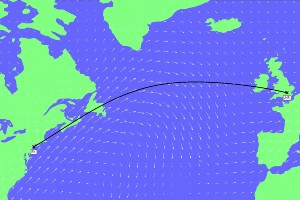Aircraft could cut emissions by better surfing the wind
26 January 2021

Airlines could save fuel and reduce emissions on transatlantic flights by hitching a better ride on the jet stream, new research has shown.
Scientists at the University of Reading have found that commercial flights between New York and London last winter could have used up to 16% less fuel if they had made better use of the fast-moving winds at altitude.
New satellites will soon allow transatlantic flights to be tracked more accurately while remaining a safe distance apart. This opportunity could allow aircraft to be more flexible in their flight paths, in order to more accurately follow favourable tailwinds and avoid headwinds, offering the aviation sector a cheaper and more immediate way of cutting emissions than through advances in technology.
Watch a video explaining the study and its findings >>>
Cathie Wells, a PhD researcher in mathematics at the University of Reading and lead author of the research, said: “Current transatlantic flight paths mean aircraft are burning more fuel and emitting more carbon dioxide than they need to.
“Although winds are taken into account to some degree when planning routes, considerations such as reducing the total cost of operating the flight are currently given a higher priority than minimising the fuel burn and pollution.”
'Cheap and immediate benefits'
Professor Paul Williams, an atmospheric scientist at the University of Reading and co-author of the new study, said: “Upgrading to more efficient aircraft or switching to biofuels or batteries could lower emissions significantly, but will be costly and may take decades to achieve.
“Simple tweaks to flight paths are far cheaper and can offer benefits immediately. This is important, because lower emissions from aviation are urgently needed to reduce the future impacts of climate change.”
The new study, published today in Environmental Research Letters, analysed around 35,000 flights in both directions between New York and London from 1 December 2019 to 29 February 2020. The team compared the fuel used during these flights with the quickest route that would have been possible at the time by flying into or around the eastward jet stream air currents.
The scientists found that taking better advantage of the winds would have saved around 200 kilometres worth of fuel per flight on average, adding up to a total reduction of 6.7 million kilograms of carbon dioxide emissions across the winter period. The average fuel saving per flight was 1.7% when flying west to New York and 2.5% when flying east to London.
The study was led by the University of Reading in collaboration with the UK National Centre for Earth Observation, the University of Nottingham, and Poll AeroSciences Ltd.
Aviation is currently responsible for around 2.4% of all human-caused carbon emissions, and this figure is growing.
Countries around the world have responded through the International Civil Aviation Organization (ICAO) by establishing policies to improve the fuel efficiency of international flights, focusing primarily on technological advances, operational and air navigation efficiencies, sustainable alternative fuels, and a carbon offsetting agreement (CORSIA) for emissions produced over international airspace.
All such measures, however, are generally costly and slow to implement due to aviation's global scale.
Climate change is likely to have a big impact on air travel, with previous Reading research showing flights will encounter two or three times more severe clear-air turbulence if emissions are not cut.

